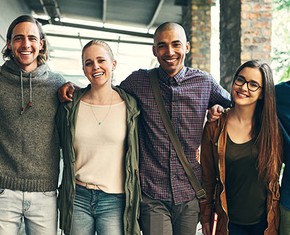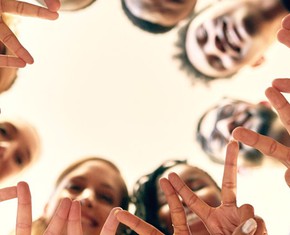The views expressed in our content reflect individual perspectives and do not represent the authoritative views of the Baha'i Faith.
In the summer of 2020, our neighbor did something incredible for our family. My husband Tim and I were driving home from Kansas, where we’d gone to see my mother, whose health was declining.
I was grateful our sons Miles and Gabe could stay on their own while we traveled. The trip had gone smoothly – but now, on the first day of our long drive back home, I got a call from Gabriel. He was crying, frantic with worry over our pet chicken.
“It’s Minerva, Mom. Something ripped her open — maybe a hawk. She’s really hurt. I don’t know what to do!”
My heart thumped with his distress; I felt at a loss so far away, when his need for guidance and comfort sounded so immediate.
As I mentally flipped through the options, our friendly, resourceful, generous neighbor Michael’s face came to mind. I said to Gabe, “I think you should go next door to Michael, and see if he can help you figure out what to do.”
RELATED: The Ring Shout: Community Building in a Centuries-Old Practice
Gabe called an hour later. His voice was calm now, and sad. “I went to Michael’s, and he came right over and looked at Minerva. He said she wasn’t going to make it. He said she would need to be killed, that that would be the right thing to do.”
“I’m so glad Michael was home, Mom. Michael told us, ‘I’m not attached to Minerva like you two are. Would you like me to take care of her?’ He got his axe, and he told us not to watch, and he put her in a box afterward, so now we can bury her.”
What, I asked myself, is the appropriate thank you for such merciful neighborliness? There’s no repaying it, and, knowing Michael, when I tried he would smile and shrug it off. It often seems clear, as I watch him with others in the neighborhood, that his joy comes from sharing and serving and connecting others. My sons already had a relationship with Michael, because he made sure that we knew each other. We’ve been in each others’ homes, offered each other food and assistance. His neighborliness goes way beyond words, and reminds me of Abdu’l-Baha’s admonition from the Baha’i writings: “Do not be content with showing friendship in words alone. Let your heart burn with loving kindness for all who may cross your path.”
I grew up in a rural community where we knew our neighbors quite well, spent time at each others’ houses, and often helped each other. But we were all of the same social and ethnic and religious background. In my adult life of city living, I have often not known neighbors who lived right next door. Our proximity is not by choice; we’ve been randomly put next to one another, and that diversity can make some people uncomfortable, or just feeling shy of others who aren’t obviously alike. But the Baha’i teachings call us to step beyond our borders:
See ye no strangers; rather see all men as friends, for love and unity come hard when ye fix your gaze on otherness. … For each of the creatures is a sign of God, and it was by the grace of the Lord and His power that each did step into the world; therefore they are not strangers, but in the family; not aliens, but friends, and to be treated as such.
We may also desire anonymity and privacy. Sometimes when people live close together they want to maintain distance. But it is a comfort and a delight, and conducive to our collective thriving, to know and share with our neighbors, putting their well-being first. It makes the neighborhood stronger when we think of each other and try to serve one another, and these actions have a ripple effect. In his version of the Golden Rule, found in all religions, Baha’u’llah wrote: “… if thine eyes be turned towards justice, choose thou for thy neighbor that which thou choosest for thyself.”
RELATED: Community Building: A Practical Way to a United World
I am fortunate to have several other lovely neighbors on my street. We share garden space and vegetables, look after each others’ watering and mail when someone goes out of town, gather in the street to chat, and welcome newcomers with food and flowers. Some of my neighbors share coffee and prayers with me on occasion, along with heartfelt conversations about our lives. These actions have a contagious effect, making the overall feeling on the block friendly and suffused with a feeling of trust in a distrustful time. Baha’u’llah said: “Be worthy of the trust of thy neighbor, and look upon him with a bright and friendly face.”
But, I’ve learned, the connections have to start by someone stepping outside their comfort zone. Neighborliness grows by being demonstrated and practiced until it becomes a part of the culture of the neighborhood.
A friend of mine who has long lived in the same house is quite purposeful and direct in her desire to build relationships with her neighbors. She goes out of her way to befriend them and bring them together. She introduces them to each other. On her street residents observe holidays together, and every Fourth of July they close the street and have a big potluck and a parade. Over time, increasing numbers of residents have created gathering spaces in their front yards. Now that they know and are comfortable with each other, her neighbors want to spend time together, not hide behind the house in their private backyards. As a result, her street feels intimate and friendly, a place where people stop to chat with friends. Because of her, the culture of the street has changed – consciously. In times of difficulty, these neighbors will likely turn to each other for help and support.
It takes courage to meet our neighbors. Sometimes I feel shy and reticent, but I’ve almost always been greeted with warmth and openness by neighbors when I make a move to befriend them. When our twins were small, we were not the most desirable neighbors. We were spilling out of a small house, and the noise of screeching toddlers was omnipresent. I decided an apology to my unknown next-door neighbor was due. I gathered my courage and knocked on her door. She smiled warmly at me, completely unfazed by the noise, and said, “Oh, it’s no problem at all! They are children. I feel their joy.” We developed a friendship, through my courage and her willingness to overlook our family chaos.
This is what a neighborhood can become; a place where we feel each other’s joy, where we have each other’s backs, where we’re available for each other’s emergencies, even when something difficult is required. I hope I can offer true assistance to my neighbors when they need it, through the inspiration and encouragement I get from the Baha’i teachings. I do hope, though, that my assistance never involves an axe and someone’s pet!
















Comments
Sign in or create an account
Continue with Googleor